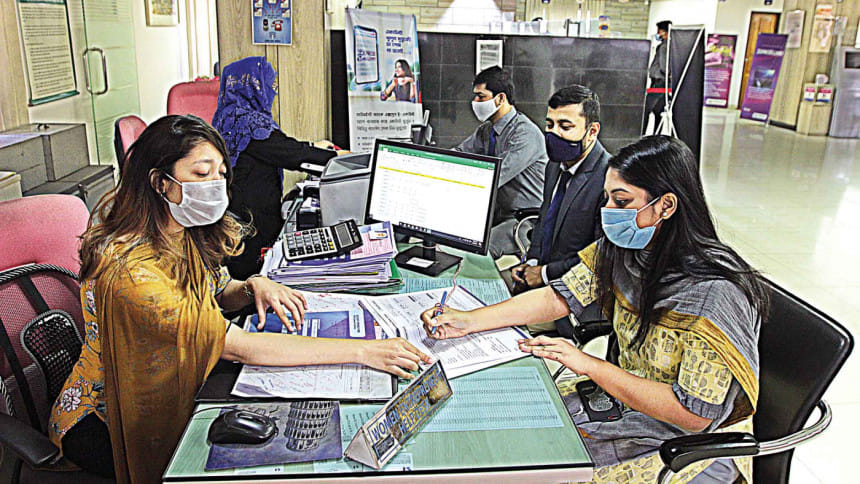Female bankers on the frontline during Covid-19

At the end of long working days, after the sun would set and the streets became deserted, Nafisa Sarwar would have to walk home all alone.
"There were no buses, no Uber or Pathao. Most of the time, I could not even find a rickshaw on my way back home from office. And especially during month-end closings, office hours would stretch into late nights. I faced tremendous difficulties in getting transport," Nafisa said.
Her struggle reflects the experiences of thousands of female bankers in the early weeks of the pandemic as they served the customers defying all odds.
Although most of the offices shut their doors in March, when the country went into lockdown to slow the spread of the highly infectious novel coronavirus, most of the branches of banks had to serve their customers as it was regarded as one of the emergency services.
Among frontline workers to high level policy makers, women were very prompt in stepping forward in order to respond to Covid-19.
Thousands of female employees of local banks continued to perform their duties, despite high risk of being infected by the deadly virus at a time when most business activities came to a halt.
The worst part of her pandemic plight was when Nafisa, trainee senior officer of Shahjalal Islami Bank, became infected by the virus in the middle of September.
"I had to isolate myself and keep a distance from my kid. My child used to cry when they couldn't come near me," she said.
However, she thanked her office management for introducing a weekly rotation system, according to which employees would work one week and take a break the following week.
"We had to perform all kinds of duties related to processing deposits, payments and withdrawal. As we had to work with a lesser number of staff due to rotation, everyone had to face tremendous pressure because of the huge workload."
Tanni Saha, senior principal officer at Eastern Bank, has to come to the office regularly as she works for the bank's trade operations.
"When the coronavirus first hit Bangladesh, various operations of local banks were suspended and the work of some operations declined. But my work is related to export and import, so there was no way to suspend it."
"At the beginning, I was mentally disturbed due to fear and some other reasons. But the positive side is that as we started working amid the pandemic from the very beginning, our fears slowly went away," she added.
She thanked her colleagues who helped her by offering pick-up and drop-off services during those challenging times.
The pandemic changed Tanni's philosophy towards her work.
"I have been working for almost ten years in private organisations and I always thought that I work only for the organisation I am employed in."
"For the first time, a sense of satisfaction developed in me. I realised that my work has a significant impact on the country and the people. It really gives me comfort knowing that."
Suraiya Afroz, vice president and head of Bank Asia's Mohakhali Branch, spearheaded the branch's business.
"Before coronavirus hit Bangladesh, I saw the news in the media and asked all my colleagues in the branch to be careful. Because, there were many hospitals and organisations around my branch including the Institute of Epidemiology, Disease Control and Research."
"But everyone thought I was a little scared. But after the virus hit Bangladesh, everyone started getting scared," she said.
Despite all the measures taken, including frequent disinfection, the branch had to close for a few weeks in April because many of its employees were infected with the virus.
"We continue to work despite all the dangers. As a woman, I work from the front," she said.
"But because of this, my mental condition was not well. Because my mother-in-law was at home, I remained isolated to keep her safe from the virus. There was always a fear. What if I contract the virus and infect one of my family members?"
Afroz was infected with Covid-19 in late August and recovered two weeks later.
Mariam Javed Juhi, head of City Alo, the dedicated women's banking division of City Bank, had the privilege to work from home during the shutdown.
However, she came up with some innovative activities to serve women in general and her clients.
City Alo started organising webinars and workshops through digital platforms.
The topics of the webinar include women in the workplace, how the fashion industry is reacting to Covid-19, knowing one's rights related to marriage, divorce and finances, experiences and lessons from survivors in fighting Covid-19, guidance on taxes during Covid-19, education during Covid-19, etc.
Workshops were conducted on digital marketing and social media, sales strategy for small businesses, career transition, child anger management, etc.
"Although we were facing unprecedented challenges, I tried to deliver something different, helping women as well as running the business," said Juhi.

 For all latest news, follow The Daily Star's Google News channel.
For all latest news, follow The Daily Star's Google News channel. 



Comments